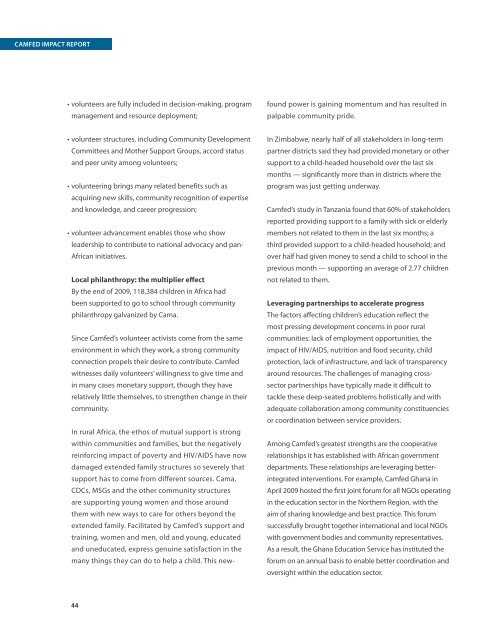Download 2010 Camfed Impact Report PDF - United Nations Girls ...
Download 2010 Camfed Impact Report PDF - United Nations Girls ...
Download 2010 Camfed Impact Report PDF - United Nations Girls ...
You also want an ePaper? Increase the reach of your titles
YUMPU automatically turns print PDFs into web optimized ePapers that Google loves.
CAMFED IMPACT REPORT<br />
• volunteers are fully included in decision-making, program<br />
management and resource deployment;<br />
found power is gaining momentum and has resulted in<br />
palpable community pride.<br />
• volunteer structures, including Community Development<br />
Committees and Mother Support Groups, accord status<br />
and peer unity among volunteers;<br />
• volunteering brings many related benefits such as<br />
acquiring new skills, community recognition of expertise<br />
and knowledge, and career progression;<br />
• volunteer advancement enables those who show<br />
leadership to contribute to national advocacy and pan-<br />
African initiatives.<br />
Local philanthropy: the multiplier effect<br />
By the end of 2009, 118,384 children in Africa had<br />
been supported to go to school through community<br />
philanthropy galvanized by Cama.<br />
Since <strong>Camfed</strong>’s volunteer activists come from the same<br />
environment in which they work, a strong community<br />
connection propels their desire to contribute. <strong>Camfed</strong><br />
witnesses daily volunteers’ willingness to give time and<br />
in many cases monetary support, though they have<br />
relatively little themselves, to strengthen change in their<br />
community.<br />
In rural Africa, the ethos of mutual support is strong<br />
within communities and families, but the negatively<br />
reinforcing impact of poverty and HIV/AIDS have now<br />
damaged extended family structures so severely that<br />
support has to come from different sources. Cama,<br />
CDCs, MSGs and the other community structures<br />
are supporting young women and those around<br />
them with new ways to care for others beyond the<br />
extended family. Facilitated by <strong>Camfed</strong>’s support and<br />
training, women and men, old and young, educated<br />
and uneducated, express genuine satisfaction in the<br />
many things they can do to help a child. This new-<br />
In Zimbabwe, nearly half of all stakeholders in long-term<br />
partner districts said they had provided monetary or other<br />
support to a child-headed household over the last six<br />
months — significantly more than in districts where the<br />
program was just getting underway.<br />
<strong>Camfed</strong>’s study in Tanzania found that 60% of stakeholders<br />
reported providing support to a family with sick or elderly<br />
members not related to them in the last six months; a<br />
third provided support to a child-headed household; and<br />
over half had given money to send a child to school in the<br />
previous month — supporting an average of 2.77 children<br />
not related to them.<br />
Leveraging partnerships to accelerate progress<br />
The factors affecting children’s education reflect the<br />
most pressing development concerns in poor rural<br />
communities: lack of employment opportunities, the<br />
impact of HIV/AIDS, nutrition and food security, child<br />
protection, lack of infrastructure, and lack of transparency<br />
around resources. The challenges of managing crosssector<br />
partnerships have typically made it difficult to<br />
tackle these deep-seated problems holistically and with<br />
adequate collaboration among community constituencies<br />
or coordination between service providers.<br />
Among <strong>Camfed</strong>’s greatest strengths are the cooperative<br />
relationships it has established with African government<br />
departments. These relationships are leveraging betterintegrated<br />
interventions. For example, <strong>Camfed</strong> Ghana in<br />
April 2009 hosted the first joint forum for all NGOs operating<br />
in the education sector in the Northern Region, with the<br />
aim of sharing knowledge and best practice. This forum<br />
successfully brought together international and local NGOs<br />
with government bodies and community representatives.<br />
As a result, the Ghana Education Service has instituted the<br />
forum on an annual basis to enable better coordination and<br />
oversight within the education sector.<br />
44
















